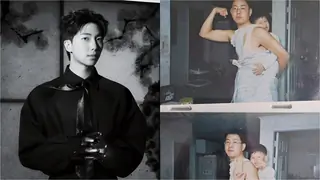Originally posted by: tia.o
Excellent point as well... However, that explains the feelings Ishwari is having. That doesn't justify what she is doing about it though. She always claimed to be only concerned about Dev's happiness and that was the reason she brought Sona back. But since then she has changed her view on Dev's happiness back to her happiness. Until now, she was just using her past to make Dev feel guilty. But now she is using her one child's unhappiness to hurt another. Ishwari might identify herself as Dev's mother. But she can't deny being a mother to her daughters as well.
People with empty nest syndrome cope with the help of other family members like spouse, parents, relatives etc. Ishwari isn't even bothering about anyone else unless to score points against Sona.
What struck me most weird was when Ishwari knocked on Dev's door at late night and said, "Your sister has come home Dev. Don't forget your family after making a new relationship. What have you arranged for Vicky?"
It seemed to me that she used Neha to remind Dev about his priorities to his family and then forgot about that completely.
Again no talk about Neha until Dev made honeymoon plans. Nothing stopped her from cooking five course meal on Dusshera or even celebrating the Navratri festival thinking even Neha would like to celebrate this festival with her husband.
And that's why her behaviour didn't match her just being at a loss for identity but more of a loss of control over Dev.
But from Ishwari's perspective, her control over Dev *IS* her identity. Remember, she was brought up in a system where women are taught that their only value is in relation to men, so Ishwari prided herself on how indispensable she was to Dev, and how much he minded her wishes. He was supposed to be the enactor of her will in the outside world. In her way of thinking, the extent of her value to him is the extent of her value period. She has no vocabulary or framework to understand her achievements outside of this idiom, nor does she feel like she interact directly with the outside world. Dev was primed to carry out her tacit orders so he seemed proactive and she seemed ever-supportive and submissive... as women are supposed to be.
I think we forget that it's a huge advantage to even have concepts like "empty-nest syndrome" in our collective consciousness. Knowing about it helps us understand what our feelings mean, and that we are not alone in feeling them. This creates a sense of validation and support while also pointing towards solutions. Those of us who have this vocabulary can see that Ishwari is suffering from deep anxiety and insecurity, but Ishwari herself does not have this advantage. She does not have a name for what she is feeling, a diagnosis that links all her symptoms. Even physiologically, you have to diagnose the underlying cause of the symptoms before you can treat the illness.
Ishwari is conscious of some of the symptoms and they do worry her: she can't bring herself to be happy in Dev's happiness, she lashes out at Sona for no reason. Yet other symptoms are invisible to her because she doesn't know there is any other way to be: getting so desperate to control Dev that she uses her daughters as pawns, for example. Again, it's like someone who has been in pain their whole life... they won't know they were in pain, or what it feels like not to be, until they are diagnosed and treated. And of course, the first, and most difficult step in all of this is asking for help.
I feel the current track is unfolding the recognition of the problem by Sona. Both Dev and Neha know Ishwari's symptoms: Dev covers them up and Neha tries to expose them, but nobody, including Ishwari has really thought about a long-term solution because the issues are too raw and traumatic for all of them. Now Dev is opening up to Sona about it slowly -- after the double dinner he gave her the briefest glimpse into the complications they face. With her newfound perspective on their relationship, Sona will start to recognise more of Ishwari's symptoms, like manipulation and passive aggressive communication, the tools of women for whom direct communication is too much of a risk. As someone with a fresh perspective and an ample store of positivity and love, hopefully Sona will be able to give Dev strength to open up and face these issues so they can work towards a healthier family dynamic.





























